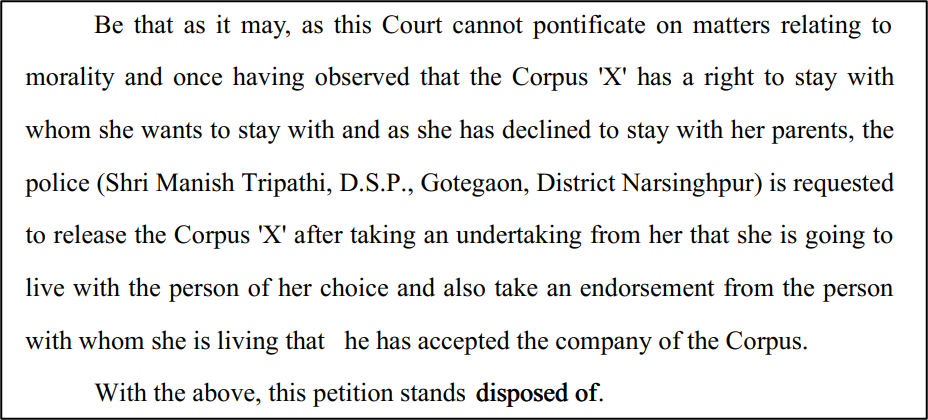In this edition of court judgements review, we look at the Chhattisgarh HC’s order that ruled that wife’s taunts, leaving matrimonial home, and refusal to return amounts to cruelty, Delhi HC’s order that misrepresentation of marital status and income constitutes fraud, Madhya Pradesh HC’s order that adult woman over 18 has right to decide whom she wants to live with, among others.
Chhattisgarh HC: Wife’s taunts, leaving matrimonial home, and refusal to return amounts to cruelty
The case, Anil Kumar Sonmani vs. Shradha Tiwari, involved an appeal by the husband against the Family Court’s order refusing to grant him a divorce. The couple married in 1996 and had two children. The husband said that after the wife completed her Ph.D. and became a college principal, her behaviour towards him changed. She often insulted him, especially during the COVID-19 pandemic when he lost his job and taunted him for being unemployed. Frequent quarrels took place at home.
On 16 September 2020, the wife left the house with their daughter, leaving behind a letter stating that she was severing all ties with her husband and son. Since then, she never returned, and despite his attempts, she refused to resume their marital life. Their son continued to live with the father while the daughter stayed with the mother.
In court, the wife did not file a reply or contest the case, either in the Family Court or in the High Court. Based on the husband’s evidence, a supporting witness, and the letter written by the wife, the High Court concluded that her conduct amounted to mental cruelty. Her continued absence from the matrimonial home since 2020 was treated as desertion.
Finding that the Family Court had wrongly dismissed the petition, the High Court allowed the appeal and granted a decree of divorce, holding that the marriage had broken down beyond repair.
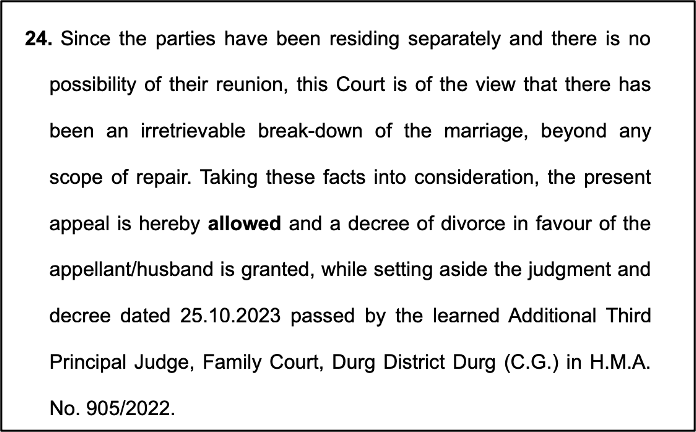
Delhi HC: Sibling bond needs strengthening through regular interaction
This case, X vs. Y, before the Delhi HC, concerned an application by the father seeking suspension of visitation rights that allowed the mother to meet their two children. The Family Court had earlier granted custody of both children to the mother, with visitation rights for the father. However, through interim orders, the son continued to live with the father in Gurugram, while the daughter voluntarily started living with the mother in the matrimonial home.
The father argued that after meeting his mother and sister, the son (aged about 9 years) became emotionally disturbed and therefore visitation should be suspended. The Court interacted with both children. The daughter, aged 14, expressed her wish to continue living with her mother. The son, being younger and impressionable, showed reluctance to meet his mother and sister.
The Court held that suspending visitation would not be in the best interests of the children. It stressed that a healthy relationship between siblings must be maintained, especially when the parents are living separately. The judges noted that custody of both children had already been granted to the mother by the Family Court, and the current arrangement allowing the son to stay with the father was only interim.
Accordingly, the Court refused to suspend visitation rights and directed that the existing arrangement, which had been operating for nearly a year, should continue until the next hearing.
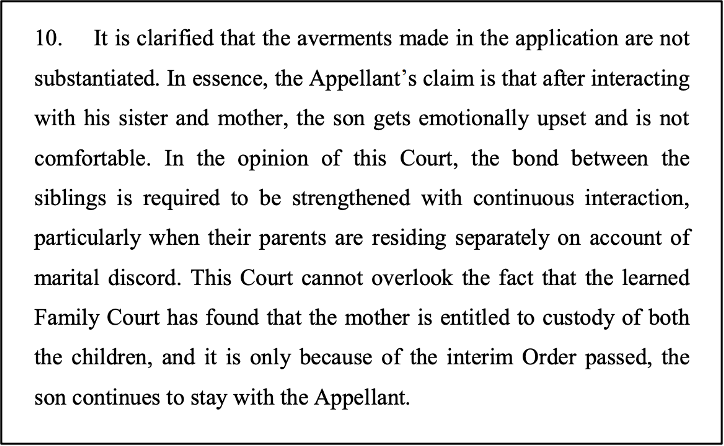
Punjab & Haryana High Court: Grants bail, observing SC/ST Act may not apply as accused himself belongs to deprived scheduled caste
The appellant in the case, Rahul Bundela vs. State of Haryana, challenged the order of the Additional Sessions Judge, Hisar, which had rejected his request for regular bail in a case registered under various IPC provisions and the SC/ST (Prevention of Atrocities) Act. The FIR, lodged in April 2024, alleged that the complainant Gurudayal, a Scheduled Caste member, was attacked inside his sawmill by Rahul, co-accused, and others with rods and sticks. They allegedly assaulted him, hurled caste-based abuses, and left him for dead. Injuries were also caused to another worker present. CCTV footage of the incident was collected, and several co-accused were arrested. Rahul was arrested much later, in June 2025.
In his appeal, Rahul argued that there was a three-day delay in lodging the FIR, that he himself belonged to a Scheduled Caste (supported by a certificate), and therefore the SC/ST Act could not be invoked against him. He claimed no specific role or injury was attributed to him in the FIR or CCTV footage. He also argued that the offences under IPC were triable by a Magistrate, he had been in custody since June 2025, and further incarceration would serve no purpose since the trial would take time.
The High Court observed that no particular injury or weapon was linked to Rahul, and the caste-based abuses were not specifically attributed to him. Further, the Court noted that since Rahul himself belongs to a deprived Scheduled Caste, it was questionable whether the provisions of the SC/ST Act could apply to him. Considering his custody period, nature of allegations, and the above circumstances, the Court allowed the appeal, set aside the lower court’s order, and granted bail, subject to furnishing personal and surety bonds.
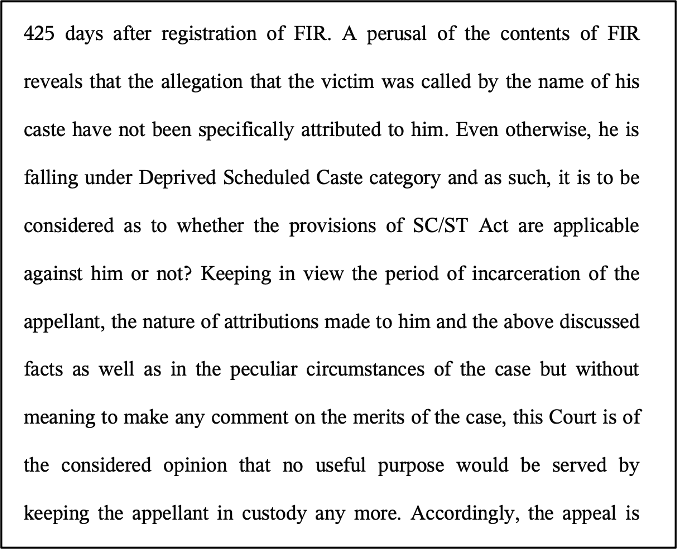
Delhi HC: Misrepresentation of marital status and income constitutes fraud
The case, X vs. Y, was an appeal against a Family Court judgment that annulled the marriage of the two parties. The lower court’s decision was based on two key findings: the husband’s concealment of a prior marriage and a misrepresentation of his salary. The couple had connected through an online matrimonial portal where the husband’s profile stated his status as “never married” and his income as “USD 200K and above”. The wife relied on these details when agreeing to the marriage
The husband contended that the wife was aware of his previous marriage, which he claimed was disclosed at a meeting in November 2014. He also argued that the annulment petition was filed too late and that the word “unmarried” in his pleadings meant he was not married at the time of the second marriage. He further asserted that his parents, who were unaware of his prior marriage and divorce, had created the profile.
The wife countered that the husband’s explanation for using the word “unmarried” was unacceptable, noting a clear difference between “unmarried” and “divorced”. She stressed that the false profile induced her to marry, and that the misrepresentation of his income was a key factor in her decision.
The High Court dismissed the appeal, finding no error in the Family Court’s judgment. The court held that deliberately misrepresenting one’s marital history is a “material fact” that goes to the very root of a marriage contract and impacts free and informed consent. The court rejected the husband’s attempt to conflate the terms “never married” and “unmarried,” calling it a “strained and self-serving interpretation”. It further affirmed that falsifying information about income is a form of fraud under Section 12 of the Hindu Marriage Act. The court also noted that the existence of a child from the husband’s previous marriage was a “profoundly material” circumstance that any prospective spouse would need to know before making a decision to marry.
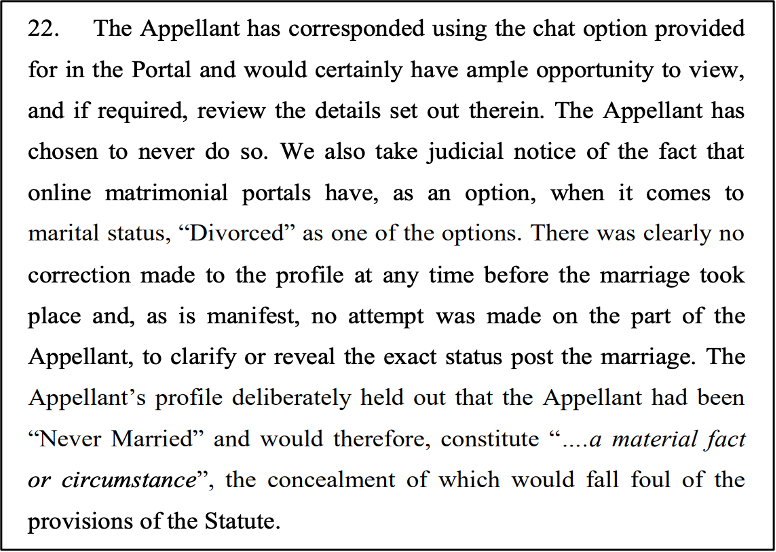
Madhya Pradesh HC: Adult woman over 18 has right to decide whom she wants to live with
The case concerns a woman, referred to as ‘X’ vs. the State of Madhya Pradesh and others. The woman, X, had eloped with a married man. She was produced before the Court, and it was undisputed that she was over 18 years old. The petitioner argued that she should live with her parents due to the man’s marital status.
The Court observed that, as an adult, ‘X’ has the right to make her own decisions regarding whom she wants to live with, regardless of whether the choice is considered morally right or wrong. The Court noted there is no law preventing her from living with a married person, and any eventuality, such as bigamy, would only allow legal action by the first wife. The State’s counsel confirmed that the man had already left his first wife and intended to file for divorce.
Given these facts, the Court directed the police to release ‘X’ after obtaining an undertaking from her that she intends to live with the person of her choice, and an endorsement from that person acknowledging her choice.
